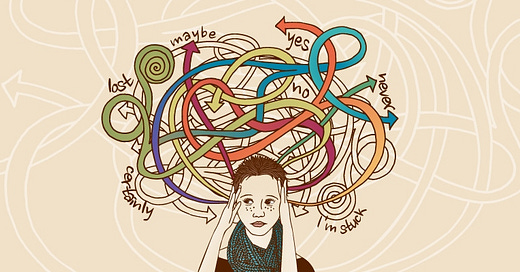Your Decisions Aren’t Entirely Yours—Here’s Why
From Netflix to Spotify, algorithms influence more than you think. Every interaction is a clue to your desires, your choices, your life. But at what point does prediction turn into prescription?
Data science has transformed the way we interact with the world. It doesn't just analyze trends; it personalizes them, creating predictions that feel uncannily attuned to who we are. Every click, every stream, every scroll leaves behind a digital breadcrumb, a clue to our desires, choices, and habits. But this powerful capability brings forth an intriguing and unsettling question: at what point does prediction become prescription?
I often find myself wondering: Is this something I truly want, or am I seeing it simply because it was recommended to me? This question has lingered in my mind, not just in personal relationships but in the daily digital experiences we all encounter. With data science woven into the fabric of our lives, from Netflix’s binge-worthy suggestions to Spotify’s perfectly curated playlists, this uncertainty has extended to our very choices. Are our preferences authentically ours, or are they subtly shaped by algorithms?
The Art of Prediction
Prediction in data science is rooted in understanding patterns. By analyzing historical data, algorithms can identify what you might want next. For instance, Netflix’s recommendation engine studies your viewing history, comparing it to millions of other users to suggest your next favorite series. Similarly, Spotify’s algorithms analyze your listening habits to create playlists that resonate with your taste. These predictions feel magical, as if these platforms know you better than you know yourself.
And, to some extent, they do. These systems don’t just understand preferences; they predict behaviors. They anticipate what will keep you engaged, what will make you click, and what will spark your curiosity. But therein lies the catch: when does a helpful nudge turn into a gentle push—or even a shove—toward something you didn’t initially desire?
When Prediction Becomes Prescription
The line between prediction and prescription is subtle yet significant. A prediction is a probabilistic insight—a guess based on data. Prescription, on the other hand, is a suggestion that carries weight, subtly influencing your actions. In a world driven by algorithms, these prescriptions are becoming increasingly commonplace.
Take, for example, the “Discover Weekly” playlist on Spotify. You listen to a few songs, find them enjoyable, and trust the system more. Over time, it begins to shape your listening habits. You’re no longer just exploring music; you’re being guided—prescribed a path of sonic experiences that align with what the system “knows” you’ll like.
Now, multiply this phenomenon across all the platforms you engage with. Social media feeds show you what’s trending, online stores highlight “people also bought” items, and dating apps recommend profiles you might “match” with. Are these interactions driven by your genuine interests, or are they subtly steering you toward predefined outcomes?
The Illusion of Choice
This leads us to an uncomfortable realization: our sense of choice might be an illusion. When algorithms dictate what we see, hear, or experience, how much agency do we really have? And how does this affect our relationships, our tastes, and even our worldview?
In personal relationships, for instance, the concept of serendipity feels increasingly manufactured. Did you stumble upon that Instagram profile because of shared interests, or did the algorithm decide it was time you met? When you buy a product, was it something you actively sought, or did a cleverly placed ad nudge you toward it? These are not hypothetical musings but real questions in an age of algorithmic influence.
Navigating the Algorithmic World
The integration of data science into daily life is not inherently negative. Predictive algorithms have undeniably made life more convenient, efficient, and personalized. The key lies in how we navigate this terrain. Awareness is the first step. Understanding that algorithms influence our choices can help us pause and reflect: Is this truly what I want?
Next, it’s crucial to maintain a balance. Engage with platforms mindfully. Seek out diverse perspectives and experiences that challenge your usual preferences. In an ecosystem designed to keep you in a feedback loop, breaking free occasionally can be a radical act of autonomy.
Finally, as creators, developers, and users of these technologies, we have a responsibility. Transparency in how recommendations are made and giving users more control over the algorithms that shape their experiences can foster a healthier relationship with data-driven platforms.
Conclusion
The tension between prediction and prescription is a defining challenge of our era. Instead of rejecting technology, we should focus on engaging with it in a mindful way, using predictions to improve our lives without letting them dictate our paths. After all, the ultimate question remains: Are we shaping our choices, or are our choices shaping us?
What’s your take? Are algorithms empowering or constraining your choices? Share your thoughts below, let’s start a conversation!





so true, we are influenced even by what we see and if the algorithm influences what we see . . . thanks for writing and for the reminder
As someone who makes a living through the Google algorithm, I feel aware that everything is an algorithm (even this post is part of it 👀). Sometimes it's OK to accept that data science can help serve us good content, while being aware enough to not let it become a drug.